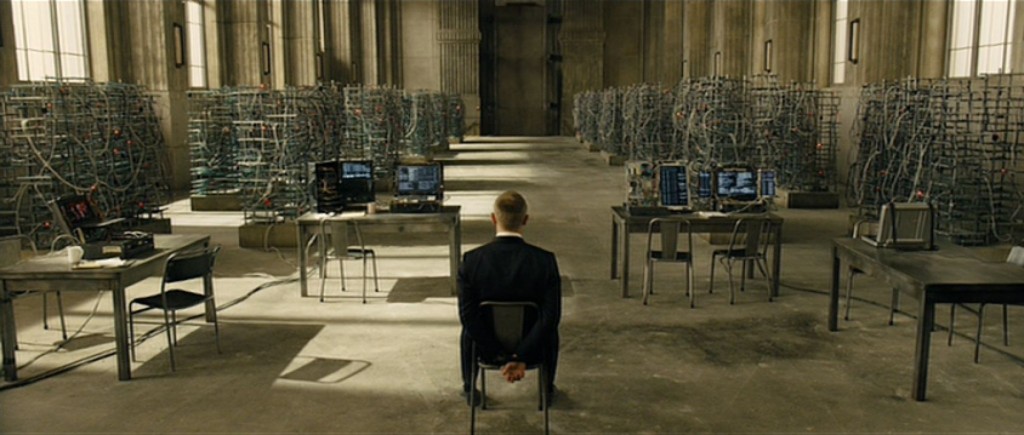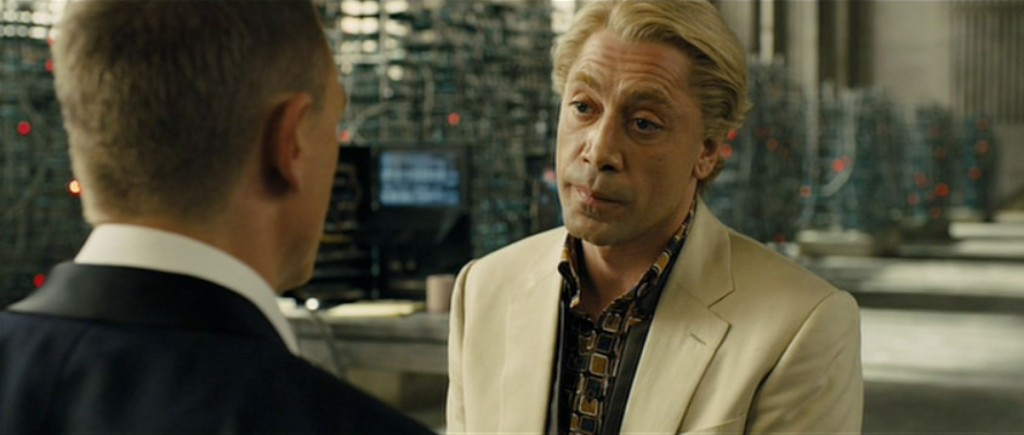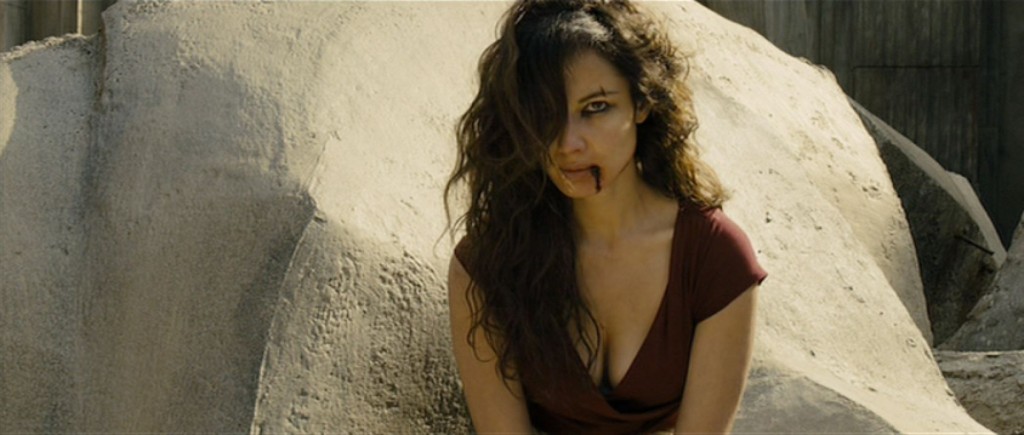James Bond: Skyfall part 6
After we check in with M and a minor contretemps with Mallory, where again old and new clash (Mallory insists M’s methods are outdated, M insists that this threat must be matched by a similar answer — a shadow against a shadow), we swoop back to the South Pacific, where Bond and Severine arrive at Bad Guy Deserted Island (looking a little bit like Mol’s Dream World from Inception). Bond is strapped to a chair (evoking painful memories of Casino Royale?) in what appears to be a server room, facing rows and rows of data — the modern weapon. And here’s our Bad Guy, Silva, monologuing straight out of the box, literally (he steps out of an elevator), which the director handles beautifully by combining the monologue with a Lawrence of Arabia-length introductory shot of Silva walking towards camera. So that Silva literally comes into focus as the monologue goes on (it’s also an echo of the first shot of the movie, with Bond coming into focus as he comes down the apartment corridor in Turkey). The monologue, of course, is Silva’s story about Rat Island, and his grandmother’s solution for killing the rats, turning them into cannibals, changing their nature. Bond says “I made my own choices,” Silva counters with “You think you did.” Fate and determinism seem a little heavy for a Bond movie, but then it fits the Craig Bond well, with the enormous shadow of Bond History looming over him. Character is habitual action, and James Bond is nothing if not end-to-end habitual action, and the question of the motivator behind that action is central to the Craig reboot. The Bonds of yesteryear are pure fantasy, stylish assassins who travel the world, stay at expensive resorts, gamble in stodgy establishments. Craig does all that, but when he goes to the expensive resort he gets in by stealing someone’s car at the valet stand and when he gambles in Monte Carlo it’s on business. You get the impression that the Connery Bond does nothing but read Esquire on his off-hours, but Craig looks like he’s never read a magazine in his life. He’s a thug who has lucked into a job where he gets to pretend to be stylish, and learns he’s good at it. That, all by itself, is more “character” than Bond has ever been invested with. When Connery quit, the producers replaced him with a male model, which shows exactly what they thought of the character: a stylish, attractive form, useful for selling products: cars, clothes, accessories, James Bond movies.
Silva lays bare not just his life story but also the central subtextual premise to Skyfall: he was once M’s favorite son, but she abandoned him and left him for dead, just as she’s done with Bond (is that why he’s a special case to her? Because he’s her way of apologizing to Silva?). M is a Bad Mother, Bond is now the favored son, Silva wants revenge.
At first, I was dismayed that Silva’s plot aims no higher than “kill M,” because I’ve always been taught that “make it personal” was the last refuge of a series that’s run out of ideas. When the writer can’t think of any more imaginative capers for the Joker, he makes the Joker’s plan to “kill the Batman.” It greatly simplifies the plotting process, greatly, but it makes the protagonist even weaker because “defending himself” is one of the weakest motivations a protagonist can have, especially a superhero, which James Bond essentially is, Batman without the cowl. Bond is supposed to “save the world,” not “protect his mother,” but Silva’s plot is refreshingly uncomplicated (Trevelyan in GoldenEye had two goals, Scaramanga in Man With the Golden Gun has three — three!) and the plotting of Skyfall speaks for itself — it’s a streamlined Gulfstream of a movie free of the ridiculous complications that plague most other Bond movies.
Silva recites Bond’s readiness-for-duty report, a piece of comedy that nevertheless makes one wince, seeing the “character” of Bond laid out like a boned fish: alcoholic, pill-popper, adolescent-minded, rebellious, mistrustful of authority, unresolved childhood trauma — in other words, a “weeping failure.” It makes him sound uncool, and not at all what we expect men to be today. And Silva’s recitation doesn’t even mention Bond’s pathological need to seduce women or his addiction to luxury items. “James Bond” has become — gasp — unfashionable by today’s standard, perhaps the most important understanding of the Craig reboot and the keynote of Craig’s great triumph: he’s established Bond as both a “good son” and as a scruffy underdog, something Bond has never been. His orphan status and his Cold War origins connect him not just to Batman but to Don Draper, another alcoholic womanizer who struggles to know himself. He shares Draper’s risk-taking and independence, both signs of orphanhood — when your family is taken away, you quickly learn to live for yourself. (Jon Hamm, of course, is also an orphan, which is how he got the part.)
Silva also makes an intense — if half-hearted — pass at Bond, connecting him to Eve — Eve traveled to Macau to bed Bond, Silva now suggests that he’s brought Bond to his island to seduce him. He also tosses out the entire 20th-century notion of statehood and patriotism — the modern man, Silva says, is stateless. They’re both orphans, really, he and Bond, but Silva has renounced all governing principles, not just family, but also nation and empire, substituting them with nothing but himself. All Bond villians are egotists of one stripe or another, but Silva is the first to have no plan besides erasing the world and filling it with himself. Other villains take over nations or bring them to their knees, Silva doesn’t even see nations any more.
(See the exchange below in the comments with Rob, who better defines this sequence.)
Silva takes Bond outside and forces him to play William Tell with Severine (echoing another Cold War icon, William S. Burroughs). He toasts to “the women we love” with a glass of 50-year-old Macallan (“a personal favorite of yours,” he adds, although I can’t find a reference to Bond drinking Macallan — I assume that it’s a reference to Bond being 50 years old and Macallan, like Bond, being Scottish) (Which he wasn’t, incidentally, until Connery made him so.). The echo left in the air is the fact that Bond has never loved any woman (I don’t buy Tracey from Her Majesty’s Secret Service at all)(although Marie Brennan, below, mentions Vesper Lynd, whom Bond loved enough to spend a whole movie seeking revenge for her death), and therefore Severine is doomed. Bond misses the target by a wide margin and Severine dies, a victim not just of Bond’s fatigue but of his inability to love.
A hair too late to help Severine, backup arrives in the form of some helicopters, and Silva is captured (we never find out what happens to his henchmen), closing out Act II at 1:20:00.



Silva’s pass at Bond left me dumbstruck, less for the pass itself (the “evil gay man” trope is hardly new) than for the way Bond responds to it: “What makes you think this is my first time?” The willingness to even hint at Bond having homosexual experience is, so far as I’m aware, unprecedented in the films. (If I’m wrong, I’d love to know.) And again, it establishes interesting flickers of character that go beyond the narrow confines of the earlier Bond franchise.
As for Severine’s death, I actually disagree that Bond has never loved any woman. I think he really did love Vesper Lynd. To me, the end of Casino Royale was about establishing the origin of Bond’s casual and callous behavior toward women: he loved her, then he thought she had betrayed him, which damaged him in ways he never really got over/fed certain negative tendencies that were already in him. For my personal taste, he was too callous about Severine here (the “waste of good Scotch” line, or rather the way Craig played it), but that’s a matter of degree.
Oh yes, I forgot about Vesper. I’ll buy that.
I don’t think he loved Severine, but his line about the scotch is putting on a brave face.
I’ll check, but I’m pretty sure the last time Bond made a comment about homosexuality was when he literally shoved a bomb up the ass of the gay assassin in Diamonds Are Forever.
I think Silva was making a pass at Bond mainly to mess with him…and then when Bond said “What makes you think this is my first time,” I think that was a reference to the torture scene from Casino Royale, when he was tied to a chair, his nethers at the mercy of the enemy.
I noticed you mentioned 006 from “GoldenEye,” which I think is noteworthy because this being an anniversary film for the Bond franchise, I picked up on a lot of meta references both to Bond’s place in the modern era, but to previous movies (the guy who gets dragged away by the komodo dragon could’ve been a dead ringer for Oddjob)…and I saw Silva as a reference to Alec Trevelyan.
“M insists that this threat must be matched by a similar answer — a shadow against a shadow”
Or a spy vs spy? Note in this scene, one agent’s in a dark suit…and another’s in a bright one!
If only they’d given both of them long prosthetic noses. It’s about time Prohias got his due.
Looking back at the lead-up to Bond’s “first time” line, I think the innuendo there is heavy enough that it stops being subtext and starts being the text. Silva’s feeling up his thigh and asking “what’s the regulation to cope with this?” — so yes, while the literal meaning of Bond’s answer might be that he’s been tied up and tortured before, I don’t think that’s what either of them is talking about by then.
Back to Todd (because I’m too lazy to start a new comment) — I wanted the scotch line to be him putting on a brave face, but that isn’t what I got from Craig’s delivery, alas. Possibly on a rewatch I would read it differently.
My feelings about Silva and Bond are heavily colored by my viewing experience here, in San Angelo, West Texas. (The shorthand I’ve used to describe San Angelo is 100k people, 40ish Jews, and 0 Thai restaurants.) We’ve got a military base here, and when I went to see Skyfall, there were a lot of young men who seemed to be from the base.
So when Silva made his pass at Bond–I probably would’ve been a little disappointed at the representation of homosexuality as predatory and laced with hints of trauma if I’d seen it in Chicago. But here, there was a lot of laughing at that moment. So: Bond sneaks into the shower of a woman who has explained her traumatic sexual past–that’s fine. A man touches Bond’s knee–that’s hilarious! (Maybe the laughter was just performative for their buddies, the equivalent of a “no homo,” but that doesn’t make it better.)
By contrast, when Bond said his line about this not being his first time, the audience was back to almost total silence. Maybe that moment was ground-breaking in Bond’s history, maybe the quick reversal from Silva’s pass to Bond’s counter-pass counteracted some of the homosexual stereotype of Silva. But watching the set-up for that was so uncomfortable because it was so easy for the audience here to slip into the “evil gay man” trope.
Silva’s predatory pass is the only regrettable moment in Skyfall, and I assume it’s there to make Silva more unpredictable — he’s an omnisexual carnivore.
I was laughing (while watching the scene at a theater in Poland, of all places), but mostly in a slack-jawed, oh my god they’re really going there kind of way.
But that’s because I know too many fanfiction writers, and so I had a mental Slash Dial whose needle was going off the chart even before Bond’s counter-pass.
A friend of mine in Austin said that the audience’s response was “held breath as every single girl in the theater, and quite a few boys, mentally ran home and typed out fifty thousand words of fan fic.”
Connery didn’t really make Bond Scottish. Fleming made his parents Scottish and Swiss, and was said to be influenced by Connery’s performance. Fleming saw the completion of the first two films, and he was on set a bit for “From Russia with Love”, although he was very ill.
That’s all I mean — Fleming made Bond Scottish because of Connery’s persuasive performance.
“we never find out what happens to his henchmen”
The ones on the island were probably just booted into the water…I think Bond killed them all.
It’s another pillars receding into the distance shot! Only in this case, replace pillars with servers–physical architecture for computer architecture.
As for Silva’s macro-plan, I want to point out you’ve identified two plans–(1) killing M(om) and (2) “erasing the world and filling it with himself”–that could be the same plan: the last Rat-cannibal erasing his past world and claiming to be self-made.
(Just ask Don Draper-nee Richard Whitman about the pleasure of being self-made.)
Silva says The Macallan is a Bond favorite because it’s what he’s swilling throughout the film. Product placement! Yay! The bottle he grabs from the empty bar, where he sees the news brief about the office bombing, is a bottle of The Macallan.
I’m enjoying reading these reviews of yours but I have to disagree with your opinions here. I think the whole meaning of Silva’s come on to Bond is that it’s part of a psychological struggle for domination. For me there’s no serious intention to imply that either of these characters are gay. Flirting with Bond is therefore a means to an end. The end being mastery of your opponent. When that fails (Bond’s ‘What makes you think this is my first time?’) Silva resorts to Plan B and the William Tell contest. Here again Bond refuses to give in. His ‘A waste of good scotch’ line is the proof of that. Yes, it might seem callous but what it’s actually about is a refusal to display any emotional weakness in front of Silva. Bond could have shot the glass off Severine’s head but what then? Silva would have had him killed. He’s standing there surrounded by armed guards, one of them holding a gun inches from his head. The only thing he can do is to make them believe he’s not the threat they perceive him to be and so defuse the tension. I thought it was a great scene and in all sorts of ways it is very Fleming-esque. In fact the same could be said, I think, of the movie as a whole.
Oh, I don’t think Silva’s come on to Bond is serious at all. And yes, the whole sequence is about dominance, with Bond having the last laugh (or so he thinks), when he pulls the helicopters out of his ass. Which leads back to the whole orphan thing: Silva spends the sequence saying “Look at me, look at everything I’ve accomplished since I cut ties with the civilized world!” Whereas Bond says “Yeah, but I’ve built a family within MI6, and here they come to rescue me.”
I’m coming to this rather late as I had to get around to rewatching the film before going through your analysis, but I’d like to add a note here. Silva’s Rat Island anecdote is a reworking of John Giorno’s poem How to Make a Killer Rat. It’s an interesting choice considering the Burroughs connection you mentioned earlier.
YOU’VE GOT TO
STARVE
A RAT
UNTIL HE IS
SO HUNGRY
HE’LL EAT
ANOTHER RAT
YOU PUT
3 RATS
IN A CAGE
AND STARVE THEM
FOR 9 DAYS
SOONER OR LATER
THE STRONGEST
RAT
WILL EAT THE OTHER 2
YOU MUST KEEP
THEM IN
COMPLETE
DARKNESS,
BECAUSE RATS
HAVE AN INSTINCT
NOT TO EAT
EACH OTHER
BUT IN BLACKNESS
THEY LOSE
THIS INSTINCT
ONCE A RAT
EATS ANOTHER
RAT,
HE GETS A REAL
TASTE FOR IT
OR BECOMES
ADDICTED.
IT’S ALL IN
THE BLOOD
THE BLOOD
IS THICK
AND SWEET,
AND ONCE
A RAT
TASTES IT,
WE WANTS IT
MORE THAN
ANYTHING ELSE
THIS IS
THE TIME
TO LET
THE RAT
FREE
HE WILL GO
HUNTING
OTHER RATS
HE KNOWS
WHERE
THEY LIVE
WHERE
THEY GO
TO EAT,
HE KNOWS ALL
THEIR HABITS
HE PREFERS
RATS
TO EATING
GARBAGE,
ELECTRICAL WIRING,
OR ANY OTHER
KIND OF FOOD
IF YOU ARE HAVING
A RAT PROBLEM,
FOLLOW
THESE INSTRUCTIONS
WHEN THE
KILLER RAT
HAS CLEAND OUT
ALL YOUR RATS,
HE WILL MOVE ON
TO OTHER RATS
IN OTHER PLACES
WHEN HE BREEDS
HIS OFFSPRING
WILL ALSO LIKE
TO EAT RATS
THEY GET
BIG
AND FAT
AS CATS
THEY GET BIG
AND FAT AS CATS.